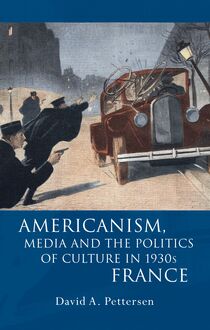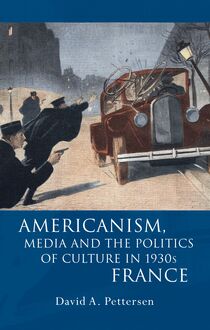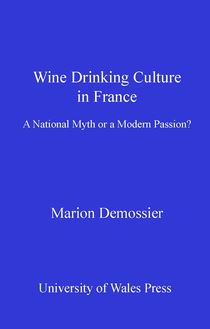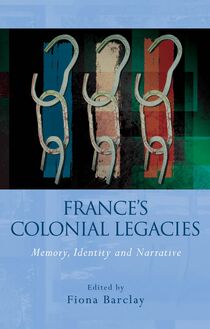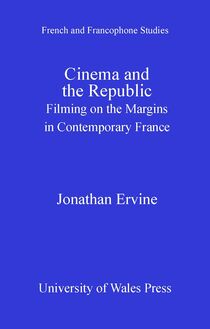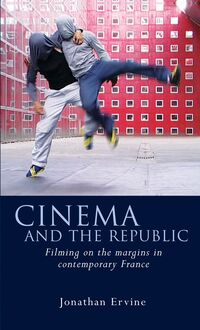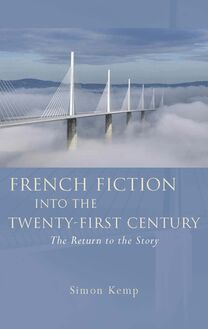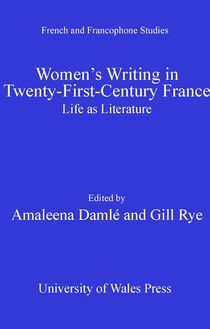-
 Univers
Univers
-
 Ebooks
Ebooks
-
 Livres audio
Livres audio
-
 Presse
Presse
-
 Podcasts
Podcasts
-
 BD
BD
-
 Documents
Documents
-
- Cours
- Révisions
- Ressources pédagogiques
- Sciences de l’éducation
- Manuels scolaires
- Langues
- Travaux de classe
- Annales de BEP
- Etudes supérieures
- Maternelle et primaire
- Fiches de lecture
- Orientation scolaire
- Méthodologie
- Corrigés de devoir
- Annales d’examens et concours
- Annales du bac
- Annales du brevet
- Rapports de stage
La lecture à portée de main
223 pages
English
Découvre YouScribe en t'inscrivant gratuitement
Je m'inscrisDécouvre YouScribe en t'inscrivant gratuitement
Je m'inscris
Obtenez un accès à la bibliothèque pour le consulter en ligne
En savoir plus
En savoir plus
223 pages
English
Obtenez un accès à la bibliothèque pour le consulter en ligne
En savoir plus
En savoir plus

Description
Explores the state of French fiction through an examination of the work of five major French writers, Annie Ernaux, Pascal Quignard, Marie Darrieussecq, Jean Echenoz and Patrick Modiano. This book deals with some of the writers on British and American university French courses.
Chapter one: Annie Ernaux and the Narrating of Time Chapter two: Pascal Quignard and the Fringes of Narrative Chapter three: Marie Darrieussecq and the Voice of the Mind Chapter four: Jean Echenoz and the Uses of Digression Chapter five: Patrick Modiano and the Problem of Endings The Return to the Story
Chapter one: Annie Ernaux and the Narrating of Time Chapter two: Pascal Quignard and the Fringes of Narrative Chapter three: Marie Darrieussecq and the Voice of the Mind Chapter four: Jean Echenoz and the Uses of Digression Chapter five: Patrick Modiano and the Problem of Endings The Return to the Story
Sujets
Informations
| Publié par | University of Wales Press |
| Date de parution | 15 juillet 2010 |
| Nombre de lectures | 0 |
| EAN13 | 9780708322741 |
| Langue | English |
| Poids de l'ouvrage | 11 Mo |
Informations légales : prix de location à la page 0,0650€. Cette information est donnée uniquement à titre indicatif conformément à la législation en vigueur.
Extrait
FRENCH AND FRANCOPHONE STUDIES
French Fiction into the Twenty-first Century
Series Editors
Hanna Diamond (University of Bath) Claire Gorrara (Cardiff University)
Editorial Board
Ronan le Coadic (Université Rennes 2) Nicola Cooper (Swansea University) Didier Francfort (Université Nancy 2) Sharif Gemie (University of Glamorgan) H. R. Kedward (Sussex University) Margaret Majumdar (Portsmouth University) Nicholas Parsons (Cardiff University) Max Silverman (University of Leeds)
French Fiction into the Twenty-first Century
The Return to the Story
Simon Kemp
UNIVERSITY OF WALES PRESS C ARDIFF 2010
© Simon Kemp, 2010
All rights reserved. No part of this book may be reproduced in any material form (including photocopying or storing it in any medium by electronic means and whether or not transiently or incidentally to some other use of this publication) without the written permission of the copyright owner except in accordance with the provisions of the Copyright, Designs and Patents Act 1988 or under the terms of a licence issued by the Copyright Licensing Agency Ltd, Saffron House, 6–10 Kirby Street, London, EC1N 8TS. Applications for the copyright owner’s written permission to reproduce any part of this publication should be addressed to the University of Wales Press, 10 Columbus Walk, Brigantine Place, Cardiff, CF10 4UP. www.uwp.co.uk
British Library Cataloguing-in-Publication Data A catalogue record for this book is available from the British Library.
ISBN 978-0-7083-2273-4 e-ISBN 978-0-7083-2274-1
The rights of Simon Kemp to be identified as author of this work has been asserted by him in accordance with sections 77, 78 and 79 of the Copyright, Designs and Patents Act 1988.
Typeset by Mark Heslington Ltd, Scarborough, North Yorkshire Printed by CPI Antony Rowe, Chippenham, Wiltshire
For Elizabeth Fallaize, with gratitude
Series Editors’ Preface
Introduction
Contents
Chapter One: Annie Ernaux and the Narrating of Time
Chapter Two: Pascal Quignard and the Fringes of Narrative
Chapter Three: Marie Darrieussecq and the Voice of the Mind
Chapter Four: Jean Echenoz and the Uses of Digression
Chapter Five: Patrick Modiano and the Problem of Endings The Return to the Story Notes Select Bibliography Index
viii 1 19 49 76 96 131 155 159 200 211
Series Editors’ Preface
This series showcases the work of new and established scholars working within the fields of French and francophone studies. It publishes introductory texts aimed at a student readership, as well as research-orientated monographs at the cutting edge of their discipline area. The series aims to highlight shifting patterns of research in French and francophone studies, to re-evaluate trad-itional representations of French and francophone identities and to encourage the exchange of ideas and perspectives across a wide range of discipline areas. The emphasis throughout the series will be on the ways in which French and francophone communities across the world are evolving into the twenty-first century.
Hanna Diamond and Claire Gorrara
Introduction
At the end of the 1980s a term began to crop up in the French literary press to describe a newly perceptible trend in fiction:le retour au récit, or the return to the story. One of the earliest appear-ances comes in a special issue ofLa Quinzaine littérairein May 1989 devoted to the question, ‘Where is French literature heading?’ In his editorial, Maurice Nadeau figures the current literary scene as a collection of ‘returns’ to literature’s traditional concerns in the wake of a period of textual experiment and theoretical formalism: ‘A return to history, a return to stories, a return to the subject (after the description of so many objects), a return to “creation”, a return to the “work of literature”, a return to characters, to plot, to story-1 telling. From now on we have every freedom.’ The periodical asks a number of authors to comment on the phenomenon, and finds them broadly agreeing on its existence, although sometimes with certain provisos. Renaud Camus, for instance, replies:
Everyone is more or less in agreement about a ‘return to the story’, but the story isn’t an unambiguous meeting-point for those, on the one hand, who never left it, and for those, like me, who went a little way out to see, from the 2 outside, what it was made of it, and what might be made of it yet.
The concept is quickly taken up by criticism discussing ‘l’extrême contemporain’, a topic which has only relatively recently been considered appropriate for academic study in France. Aron Kibédi-Varga writes in 1990: ‘What is perhaps most deeply characteristic of the new postmodern literature is the renarrativization of the text, 3 the effort to construct stories once again.’ In the same year, Jean-Claude Lebrun and Claude Prévost critique the term, noting, as Nadeau did before them, that such a return need not imply a retreat to a Balzacian model of storytelling, and expressing a prefer-ence for the expressionretour du récitas better encapsulating a sense of ‘reinvestment in a broadened tradition, which can encompass
-
 Univers
Univers
-
 Ebooks
Ebooks
-
 Livres audio
Livres audio
-
 Presse
Presse
-
 Podcasts
Podcasts
-
 BD
BD
-
 Documents
Documents
-
Jeunesse
-
Littérature
-
Ressources professionnelles
-
Santé et bien-être
-
Savoirs
-
Education
-
Loisirs et hobbies
-
Art, musique et cinéma
-
Actualité et débat de société
-
Jeunesse
-
Littérature
-
Ressources professionnelles
-
Santé et bien-être
-
Savoirs
-
Education
-
Loisirs et hobbies
-
Art, musique et cinéma
-
Actualité et débat de société
-
Actualités
-
Lifestyle
-
Presse jeunesse
-
Presse professionnelle
-
Pratique
-
Presse sportive
-
Presse internationale
-
Culture & Médias
-
Action et Aventures
-
Science-fiction et Fantasy
-
Société
-
Jeunesse
-
Littérature
-
Ressources professionnelles
-
Santé et bien-être
-
Savoirs
-
Education
-
Loisirs et hobbies
-
Art, musique et cinéma
-
Actualité et débat de société
- Cours
- Révisions
- Ressources pédagogiques
- Sciences de l’éducation
- Manuels scolaires
- Langues
- Travaux de classe
- Annales de BEP
- Etudes supérieures
- Maternelle et primaire
- Fiches de lecture
- Orientation scolaire
- Méthodologie
- Corrigés de devoir
- Annales d’examens et concours
- Annales du bac
- Annales du brevet
- Rapports de stage
Signaler un problème
YouScribe
Le catalogue
Le service
© 2010-2024 YouScribe


